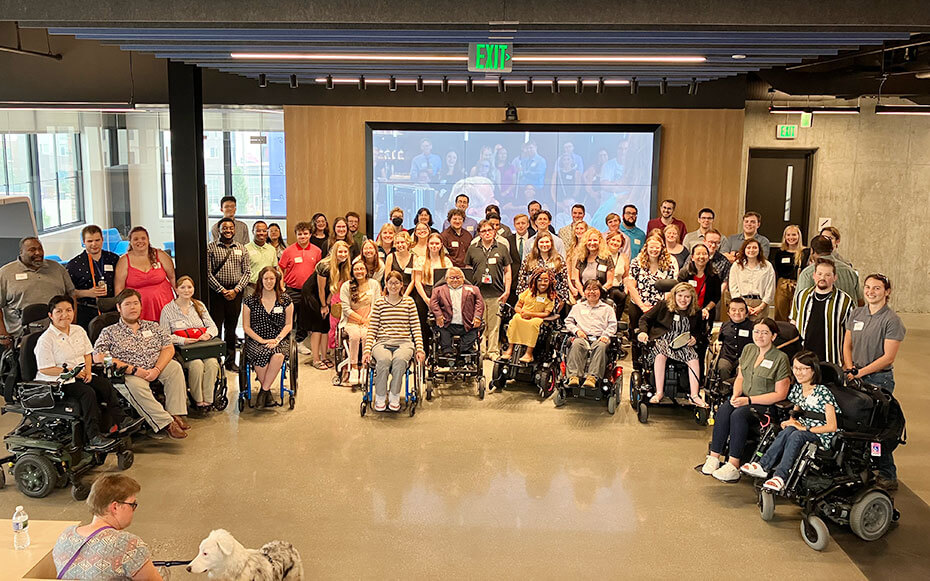The Gregory S. Fehribach Center at Eskenazi Health in Indianapolis was created in 2013 to empower Indiana college students with physical disabilities to achieve equitable employment following graduation.
With a mission to promote the opportunity for economic independence, equitable employment, and full economic and civic engagement for college graduates with physical disabilities, the Fehribach Center uses a multi-dimensional model—an internship program, research operations, and educational outreach—to achieve it.
The foundation of the Fehribach Center is the internship program, during which participants gain experience in paid internships that advance their career goals.
NACE AWARD WINNER
The Gregory S. Fehribach Center at Eskenazi Health is the winner of the 2024 Chevron Innovation Award for its work to empower Indiana college students with physical disabilities to achieve equitable employment following graduation. For more information about the NACE Awards program, see www.naceweb.org/about-us/nace-awards/.This is especially important because, as Fehribach Center Director Larry Markle explains, individuals with “apparent” physical disabilities (i.e., mobility, orthopedic, visual and/or hearing) often face greater implicit bias with potential employers and co-workers.
“These systemic barriers can complicate their ability to develop effective workforce preparedness. Consequently, far too many adults with disabilities are unemployed or underemployed, even after earning a college degree,” Markle says.
“Research has demonstrated that successful employment outcomes for college graduates with disabilities are strongly enhanced by paid work experiences and a college degree. Yet studies have also demonstrated that postsecondary students with disabilities seek out work experiences and career services less often than students without disabilities.”
Markle cites research from the Bureau of Labor Statistics that found that in the United States in 2023, 75% of non-disabled college graduates were employed, but only 31.3% of college graduates with disabilities were employed.
“One of the primary barriers to equitable employment is lack of workforce experience and networking opportunities,” Markle says.
“Oftentimes, students with disabilities don’t participate in traditional career development activities on campus.”
For example, the setup and bustle of a traditional career fair might not be accessible for students in wheelchairs or for those with vision or hearing impairments.
“There has to be intentionality on the part of colleges and employers in making sure students with disabilities participate in career services on campus. That’s why partnerships between career services, disability services, and employers are so critical,” Markle says.
“The Center addresses these inequities, removes these barriers, and helps facilitate these connections. Our purpose is to help students get good experience to be good candidates for employment.”
Providing development and opportunities for more than a decade
The Fehribach Center began in 2013 as a partnership between Eskenazi Health and Ball State University to provide students with physical disabilities with internships in fields related to their academic pursuits.
The center was founded by Gregory S. Fehribach, an Indianapolis attorney and presidential appointee to the United States Access Board, an independent federal agency that promotes equality for people with disabilities through leadership in accessible design and the development of accessibility guidelines and standards. Christia Hicks, chief human resources officer at Eskenazi Health, partnered with Fehribach and Markle to establish the center at Eskenazi Health.
In addition to Fehribach, Hicks, and Markle, other members of the Fehribach Center’s team include Carlos Taylor, internship program manager; Dr. David Parker, research and educational outreach manger; Dr. Roger Wessel, external evaluator; and Tehanee Ratwatte, career consultant.
The Fehribach Center expanded in 2017 by recruiting students from other Indiana colleges and facilitating internships for students at additional employers in the Indianapolis area. Five years later, in 2022, the Fehribach Center initiated efforts to recruit college students with physical disabilities from states contiguous to Indiana.
Fehribach Center interns are matched with employers for an eight-week, full-time, paid work experience in jobs related to their majors. Interns are assisted in implementing accommodations and participate in weekly professional development workshops on topics such as workplace disclosure, managing personal finances, and pursuing leadership opportunities on the job. In addition to the internship, housing and transportation assistance is provided.
In 2020, the Fehribach Center began developing a research agenda with a goal of becoming a national leader in academic research pertaining to equitable employment for college students and graduates with physical disabilities.
The Fehribach Center established a research advisory board consisting of nationally recognized scholars who conduct research on college students with disabilities.
“A key component of the center’s mission is to facilitate and disseminate research about the career experiences of adults with physical disabilities during and after college,” Markle points out.
“Few studies to date have pinpointed the most significant barriers to successful career preparation for students with physical disabilities. Similarly, only a small body of literature has documented evidence-based practices for promoting meaningful career engagement in college graduates with mobility, orthopedic, visual, and/or hearing impairments. Eventually, the center will use emerging research findings to help inform policymakers at the state and national levels.”
The center is also developing educational outreach activities for communities that include higher education, K-12, families, and employers.
“One such activity is a year-long Community of Practice involving disability service providers and career services staff at Midwestern universities,” Markle explains.
“Fehribach Center staff facilitate interactive presentations from these professionals about their collaborative efforts to enhance evidence-based career services to disabled students on their campus.”
The Fehribach Center’s educational outreach efforts highlight systemic barriers to full employment and civic engagement of college graduates with disabilities, link the disability rights movement to the civil rights movement and current efforts to promote an inclusive and diverse workforce, and foster partnerships between educators to engage in best practices related to career development for students with disabilities.
Impressive outcomes
The Fehribach Center’s impact has been significant. From a single Ball State student in 2013, the program now has grown to include 196 students from 41 colleges and universities from five states who have been placed in 401 internships at 39 different Indiana employers. These employers include, among others, Ascend Indiana, BraunAbility, Christel House International, Cummins, Eli Lilly and Company, Eskenazi Health, Ice Miller, the Indiana Pacers, the Indianapolis Children’s Museum, and Republic Airways.
Among Fehribach Center program interns:
- 94.5% have graduated and found equitable employment or are continuing their education;
- 91% of interns who have entered the job market have found equitable employment; and
- 21 have been hired for full-time positions at Indianapolis-area companies where they interned.
Dr. Wessel, who is a former executive editor of the Journal of Postsecondary Education and Disability, collects extensive data from interns and employers to assess participants’ experiences and to strengthen the program’s capacity to meet its goals. The evaluation of the internship program is based upon the following intended program outcomes.
For interns, improved self-efficacy of individuals with physical disabilities demonstrated through:
- Greater autonomy and self-determination;
- Increased knowledge of skills through professional development;
- Empowerment for career readiness; and
- Acquisition of meaningful work experiences.
For supervisor/coworkers, enhanced workplace culture demonstrated through:
- Increased awareness of disability issues;
- Improved capacity to create an inclusive and accessible environment; and
- Effective mentoring and supervising.
The Fehribach Center also administers a Post-Internship Career Status Survey (PICSS) to each cohort of interns four months after the completion of the internship to determine their next destination. The assessment process the center administers with each cohort provides rich data regarding outcomes for interns and supervisors. Highlights include:
- Post-internship experiences exceeded pre-internship expectations for all outcomes;
- Interns experienced meaningful work experiences and participated in real work-like experiences during their internships;
- Employers referred to interns in glowing terms: enthusiastic, committed, pleasant, and positive; and
- A recent summary of PICSS data found that 91% of interns were actively advancing in their careers following the internship.
Other outcomes underscore the program’s reach. Through the end of 2023, the Fehribach Center has funded eight studies by professors from Ball State, Kent State, Penn State, UConn, the Milwaukee School of Engineering, George Mason, and the University of Illinois-Chicago. A special issue of the Journal of Postsecondary Education and Disability (JPED) scheduled for 2024 will focus on the Fehribach Center with findings from its research projects and examples of best practices.
The college Community of Practice initiative has been successful. Personnel in disability services and career services offices from three campuses come together annually to create enhanced career development programming for students with disabilities. Thus far, participants have included Indiana, Rose-Hulman, Evansville, Ball State, Butler, Purdue-Fort Wayne, Notre Dame, Louisville, and Ivy Tech Indianapolis.
Fehribach Center staff have also presented their work to six national conferences in 2023, including leading a two-part webinar series with NACE as part of its Disability Signature Series. The focus of the webinars was the consideration of disability as a component of DEI efforts.
Across the past 11 years, the Fehribach Center has made tremendous progress in its founding objective of empowering Indiana college students with physical disabilities to achieve equitable employment following graduation.
“We’re always careful to explain to employers that the college students we work with have met all the same standards for admission to the university as students without physical disabilities. They take the same classes, earn the same degrees, and have the same expectations. These are amazingly talented college students who need an opportunity. We tell employers they may be missing the best person for a job if they haven’t considered the person with a physical disability. The message of the Fehribach Center has resonated and the buy-in from the corporate world has been fantastic,” Markle says.
“The Fehribach Center at Eskenazi Health is always going to be an Indianapolis-based organization, but I think this model could be easily replicated by other colleges and universities and employers. It benefits all involved, but especially our talented students with physical disabilities who gain valuable internships and work experience as they prepare to successfully enter the workforce.”







